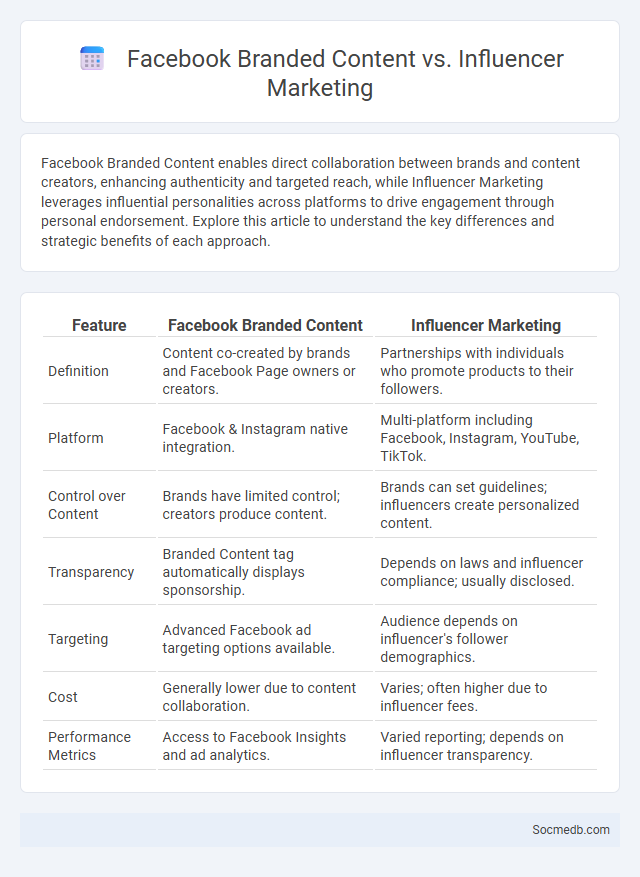
Photo illustration: Facebook Branded Content vs Influencer Marketing
Facebook Branded Content enables direct collaboration between brands and content creators, enhancing authenticity and targeted reach, while Influencer Marketing leverages influential personalities across platforms to drive engagement through personal endorsement. Explore this article to understand the key differences and strategic benefits of each approach.
Table of Comparison
| Feature | Facebook Branded Content | Influencer Marketing |
|---|---|---|
| Definition | Content co-created by brands and Facebook Page owners or creators. | Partnerships with individuals who promote products to their followers. |
| Platform | Facebook & Instagram native integration. | Multi-platform including Facebook, Instagram, YouTube, TikTok. |
| Control over Content | Brands have limited control; creators produce content. | Brands can set guidelines; influencers create personalized content. |
| Transparency | Branded Content tag automatically displays sponsorship. | Depends on laws and influencer compliance; usually disclosed. |
| Targeting | Advanced Facebook ad targeting options available. | Audience depends on influencer's follower demographics. |
| Cost | Generally lower due to content collaboration. | Varies; often higher due to influencer fees. |
| Performance Metrics | Access to Facebook Insights and ad analytics. | Varied reporting; depends on influencer transparency. |
Understanding Facebook Branded Content
Facebook Branded Content allows creators and publishers to share sponsored posts that comply with Facebook's transparency policies, clearly identifying paid partnerships. This feature enhances authentic brand storytelling by enabling seamless integration of promotional messages within regular content, boosting engagement and reach. Marketers benefit from detailed insights and audience targeting options, making Facebook Branded Content a powerful tool for driving brand awareness and conversion.
What is Influencer Marketing?
Influencer marketing leverages individuals with established social media followings to promote products or services authentically. By partnering with influencers who align with a brand's target audience, companies amplify their reach and build trust through relatable content. This strategy capitalizes on influencers' credibility and engagement to drive customer acquisition and brand awareness effectively.
Defining Branded Content in Modern Marketing
Branded content in modern marketing refers to creating meaningful, engaging media that seamlessly integrates a brand's identity and message to connect with target audiences. This content goes beyond traditional advertising by delivering value and storytelling that resonate emotionally, enhancing brand loyalty and awareness. Your social media strategy benefits from branded content by fostering authenticity and driving higher engagement across platforms.
Key Differences Between Facebook Branded Content and Influencer Marketing
Facebook Branded Content involves paid partnerships where brands create and share content through Facebook's official tools, ensuring transparency and adherence to platform policies. Influencer marketing leverages individual creators' personal audiences to promote products organically, often focusing on authenticity and personal endorsement. The key difference lies in branded content's direct brand control and platform facilitation versus influencer marketing's reliance on influencer creativity and relationships.
Benefits of Facebook Branded Content for Brands
Facebook Branded Content enhances brand visibility by leveraging trusted creators' audiences to increase engagement and reach. Brands benefit from authentic storytelling that fosters deeper connections and drives higher conversion rates. Data shows that campaigns using Facebook Branded Content achieve up to 30% more engagement compared to traditional ads, optimizing marketing ROI.
Advantages of Influencer Marketing Campaigns
Influencer marketing campaigns enhance brand visibility by leveraging influencers' established audiences, resulting in higher engagement rates compared to traditional advertising. These campaigns foster authentic connections with target demographics, increasing trust and conversion rates through personalized content. Brands benefit from cost-effective strategies that offer measurable results and scalable reach across diverse social media platforms.
Challenges: Facebook Branded Content vs Influencer Marketing
Facebook Branded Content faces challenges such as limited organic reach and strict content guidelines, while Influencer Marketing demands careful influencer selection and can involve higher costs with variable ROI. You must navigate algorithm changes impacting branded post visibility and ensure authentic partnerships that resonate with target audiences. Balancing these factors is crucial for maximizing engagement and campaign effectiveness on social media platforms.
Content Performance and Measurement Metrics
Social media content performance is evaluated through key metrics such as engagement rate, reach, and click-through rate, which indicate how effectively content resonates with the audience. Measuring sentiment analysis and shareability provides deeper insights into audience perception and content virality. Tracking conversion rates and follower growth additionally helps quantify the impact of social media campaigns on business objectives.
Choosing the Right Strategy for Your Brand
Selecting the right social media strategy for your brand involves analyzing your target audience's demographics, preferences, and online behavior to tailor content that maximizes engagement. Leveraging platform-specific features such as Instagram Stories, LinkedIn articles, or TikTok trends enhances brand visibility and drives conversion rates. Measuring key performance indicators (KPIs) like reach, engagement rate, and click-through rate ensures continuous optimization and alignment with business objectives.
Future Trends in Branded Content and Influencer Marketing
Future trends in branded content and influencer marketing emphasize authentic storytelling and deeper audience engagement through micro-influencers and nano-influencers, who offer higher trust and niche targeting. The integration of AI-driven analytics allows brands to optimize content performance and personalize influencer partnerships at scale, enhancing ROI. Augmented reality (AR) and virtual reality (VR) experiences are increasingly incorporated to create immersive branded content that boosts interaction and brand loyalty.
 socmedb.com
socmedb.com